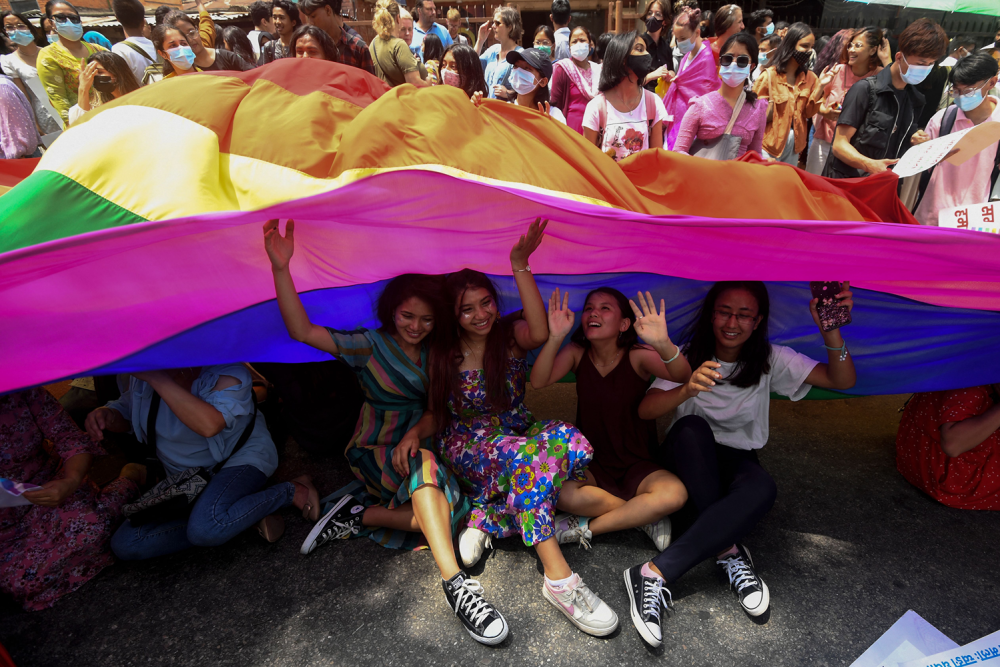
Kathmandu : After years of hiding their relationship, Jeshika Gautam and Samjhana Bishwakarma now openly live together as a lesbian couple in Nepal’s capital, Kathmandu. Despite familial disapproval, the pair, both in their 20s, say the gradual shift in social attitudes and the country’s progressive LGBTQ laws encouraged them to declare their love publicly. Now, after dating for five years, they’re ready to marry.
But Nepal has yet to recognize same-sex marriage, 15 years after the country’s Supreme Court granted equal rights as other citizens to people of sexual minorities and ordered the government to form a study committee on marriage equality. Now, a petition at the court is demanding marriage equality by challenging the country’s 2017 Civil Code, which defines marriage as a union between a man and a woman. Petitioners are asking for an amendment saying marriage should occur between two individuals of undefined gender, which would pave the way for same-sex unions.
The hearing for the case, initiated by Mitini Nepal—a nonprofit working for the rights of the lesbian, bisexual, and transgender community—alongside its president, executive director, and others, was scheduled for Wednesday, May 31. But it has now been postponed to Nov. 8.
“It’s been a long battle,” Gautam told Foreign Policy. “We want the same rights and equality as other couples. We want to get married.”
Nepal is touted as a leader in LGBTIQ rights in the region, thanks to the landmark 2007 case—which was cited by India’s Supreme Court when scrapping India’s colonial-era anti-gay law in 2018—and its new republican constitution, passed in 2015, which is among the handful of pro-LGBTIQ constitutions in the world. The 2007 case was the result of onerous advocacy and legal battle by LGBTIQ activists and nonprofits, such as the Blue Diamond Society, a group founded in 2001 to advocate against the country’s discriminatory laws.
Thanks to these efforts, the Supreme Court, in a remarkable decision for the time, heralded a new chapter for LGBTIQ Nepalis, saying in 2007 that the community was being denied fundamental human rights and should be guaranteed equal rights in the upcoming constitution.
The Himalayan nation now has provisions to identify as “other” instead of male or female on citizenship ID and passport, though transgender activists say it’s still a daunting task. In 2021, Nepal added the third gender category to its census for the first time. But while many of Nepal’s LGBTIQ rights laws are progressive on paper, rights advocates say implementation hasn’t been on par with the promises.
A week before last month’s scheduled court hearing date, Sarita KC, executive director of Mitini Nepal, told Foreign Policy that the petition against the Nepal government wasn’t just about demanding marriage equality but also about securing LGBTQ citizens’ safety and security, from parenthood to inheritance to insurance-related rights. KC, along with her nonprofit and its president Laxmi Ghalan, petitioned against Nepal’s Office of the Prime Minister and Council of Ministers; Ministry of Law, Justice, and Parliamentary Affairs; and Federal Parliament Secretariat. Responding in January to the court’s show cause order, all three government bodies separately wrote, in documents seen by Foreign Policy, that the constitution guarantees equal protection for LGBTIQ people and that the petition to amend marriage law in the Civil Code should be annulled.
“Even though the constitution guarantees it, we have yet to be equals,” KC said. “We just want people from this community to be able to marry whom they want, start a family, and have all the rights just like heterosexual couples.”
Activists say legalizing same-sex marriage in Nepal is just a matter of time, though it’s taking longer than expected. The same-sex marriage study committee formed after the 2007 decision submitted a report recommending the government act in 2015. The detailed report suggested the government remove legal provisions allowing only a man and a woman to marry and “embrace the norm that marriage can occur between two persons, and … grant legal recognition to same-sex marriage on the basis of the principle of equality.”
Today, the signs from the court itself are good, given it has also acknowledged the validity of same-sex relationships in multiple cases. Nepal’s constitution has a provision for 20 justices, to be appointed by the country’s Judicial Council, to sit on the Supreme Court. There are currently 15 sitting justices, including Hari Prasad Phuyal, who represented the petitioners in the 2007 case and was a member of the same-sex marriage study committee.
Source : foreignpolicy.com
Copyright © All right reserved to pahichan.com Site By: Sobij.